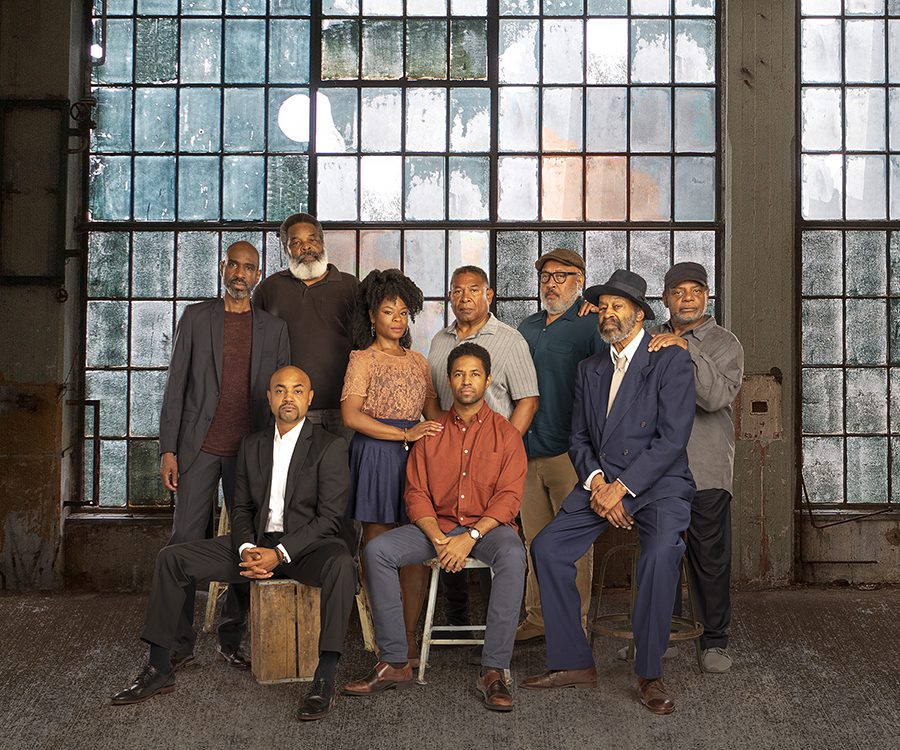Arena Stage’s Season of Wilson
By • September 13, 2019 0 1340

The late and great American playwright August Wilson — master chronicler of African American life in the 20th century — grew up in the Hill District of Pittsburgh, but he lived and worked and achieved theatrical excellence and fame in other places, from Broadway to Minnesota to Seattle.
It seems to many theatergoers in Washington, D.C., that Wilson has long cast a special light in this city, thanks to the regular and various iterations of the 10 plays that constitute his so-called Pittsburgh Cycle. In 2009, four years after Wilson’s death at the age of 60, the Kennedy Center presented a festival of staged readings of all 10 plays, but those 10 have been with us since the 1980s, performed at venues around town and across the region.
Audience members go on a journey as they amass the experience of the plays, one by one. You’ll notice, for instance, that all of them, not just those with musical subject matter, are infused with the blues, a genre and tradition and philosophy close to Wilson’s heart.
In an interview, Wilson remembered that he used to go to a used record shop, getting what he could, and quite by accident discovered blues singer Bessie Smith. He had one record, he recalled, that he played 22 times in a row.
This writer first came in contact with Wilson’s world in 1986 with a production at Studio Theatre of “Ma Rainey’s Black Bottom,” followed by an eye-opening production of “The Piano Lesson,” starring Charles Dutton, in 1990 at the Kennedy Center.
This season, Arena Stage is celebrating the two-time Pulitzer Prize winner’s work with an August Wilson Festival. Running from Sept. 13 to Oct. 26, “Jitney,” technically the first of the plays in the cycle, is set in 1977 and focuses on the lives and world of black cab drivers confronted with change and gentrification. The production is directed by Ruben Santiago-Hudson, who directed the recent Broadway version.
The other full-length production of the festival is “Seven Guitars,” a rich, multi-character work set in the 1940s. Directed by Tazewell Thompson, it will be performed from April 3 to May 3.
From start to finish, the festival will be rich in post-show discussions, lectures, panels, films and master classes dealing with aspects of Wilson’s rich world of specific and universal theater.
“When considering influential American playwrights, August Wilson is clearly a giant among giants,” said Arena Stage Artistic Director Molly Smith. “His ideas and language and artistry pulled American theater into the 21st century before we had even gotten there ourselves.”
Arena Stage has produced nine of the 10 plays in the cycle. “This is our 70th anniversary season, and it’s a perfectly appropriate way for us to celebrate his work, and with great directors like Santiago and Tazewell,” Smith said. “Our history is tied up with his. His stature is such that he is one of the preeminent American playwrights, period. He is our Shakespeare, our Homer in a way.
“Frankly, I hope we can start another Wilson fever, introduce his work to a new audience and new level of understanding for all audiences.”
The first panel, on Monday, Sept. 16, from 7 to 8:30 p.m., is “Designers Panel: Building the World of August Wilson,” moderated by two-time Tony-nominated costume designer Constanza Romero Wilson, the playwright’s widow and the overseer of his legacy and literary estate.
The two met while working on a production of “The Piano Lesson.” “I learned from him,” she said. “It’s a very difficult play, about family legacy, the idea of heritage and what family things meant to different people. So when designing clothing that people wear, you think about who they are — a man interested in money, a woman who saw the importance and values of memories.”
Wilson and Romero married in 1994 and had one child, a daughter, Azula Carmen Wilson.
“He was, is, a very charismatic man,” she said. “He was a listener. I sometimes wake up thinking about him first thing in the morning. Taking care of and dealing with his legacy, a lot of my days are taken up with August. But it’s more than that. Sometimes, when you work or read a play or watch a rehearsal, something in the day, it’s like a ripple. I wonder what he would think, or I remember him talking.”
The 10 plays are quite often referred to as the Pittsburgh Cycle. “That’s not so,” she said. “It’s the American Century Cycle.”
Each describes the lives of members of an African American community in Pittsburgh in one decade of the 20th century. They were not written chronologically, although some characters appear in more than one play or are referenced in others.
“These plays take place in a world which the majority of Americans know very little about, if at all, and that’s a matter of history,” Romero said. “But people, all sorts of people, have responded to the plays, all over the country and world. He is a superb, naturalistic storyteller, but he is also a poet, a gifted one. His use of language draws people in.
“It’s been 14 years since August died,” she said. “He remains a presence every day.”
He does the same in the theater, on the page and on the stage. The plays — all 10 of them — are a kind of song cycle. In the sets, in the words, is something universal.
They deserve to be remembered, en masse, in decade order: “Gem of the Ocean” (1900s), “Joe Turner’s Come and Gone” (1910s), “Ma Rainey’s Black Bottom” (1920s), “The Piano Lesson” (1930s), “Seven Guitars” (1940s), “Fences” (1950s), “Two Trains Running” (1960s), “Jitney” (1970s), “King Hedley II” (1980s), “Radio Golf” (1990s). One could say that they read like inscriptions on a monument.

